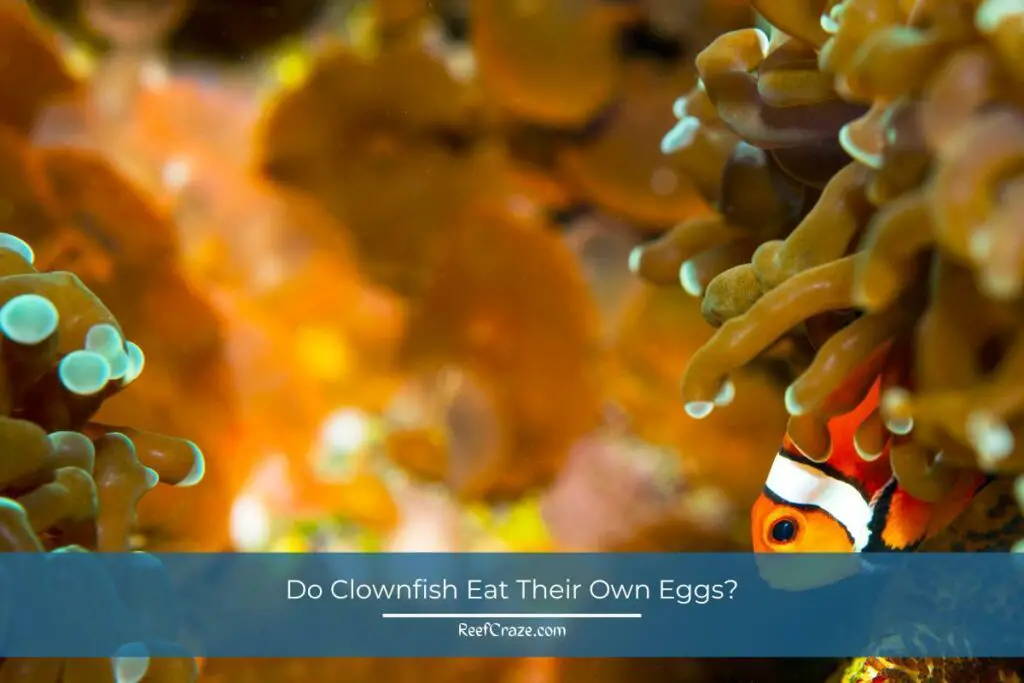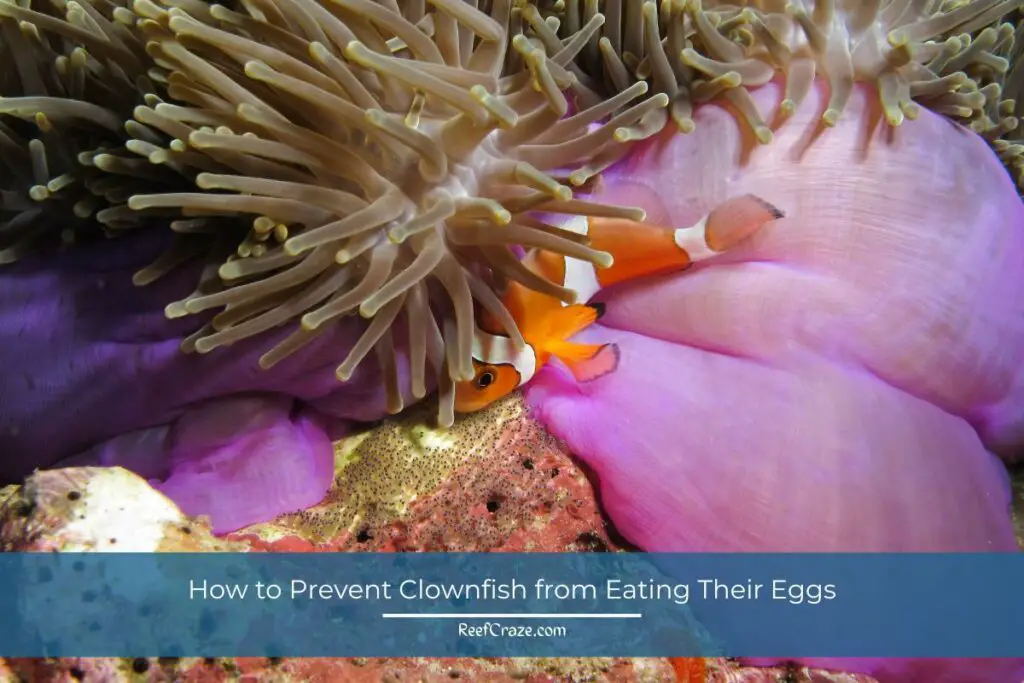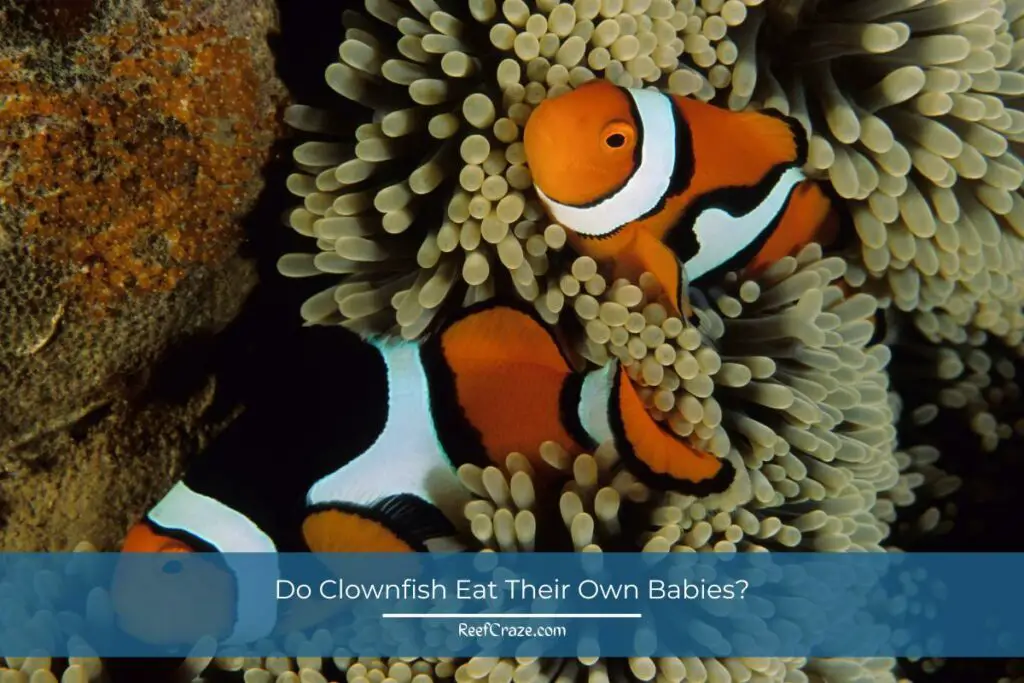Clownfish are colorful and fascinating marine creatures that often raise questions regarding their behavior and life cycle. One such question revolves around whether or not clownfish eat their own eggs. Understanding the reasoning behind this behavior is essential for both saltwater aquarium enthusiasts and those interested in marine life in general.
Male clownfish are in charge of taking care of their eggs, and they typically stay very close to the nest. They exhibit a behavior where they eat eggs that are considered nonviable—most likely because they were not fertilized or are damaged. This is a protective measure that helps preserve the remaining eggs, as these nonviable eggs can attract harmful bacteria and fungus, which can affect the rest of the spawn.
Key Takeaways:
- Clownfish, specifically the male, may eat their own nonviable eggs in order to protect the viable ones
- Nonviable eggs can lead to harmful bacteria and fungus growth, which affects the remaining healthy eggs
- Understanding this behavior is important for both saltwater aquarium enthusiasts and general marine life knowledge.

Reasons Why Clownfish Eat Their Own Eggs
Various circumstances might prompt clownfish to consume their own eggs. Let’s explore these situations in greater detail.
1. Inexperienced Parents
In their first few spawnings, clownfish may eat all their eggs, as they are still learning the ropes of being parents. Both parents can exhibit this behavior, but the male clownfish, being the more submissive of the pair, is primarily responsible for tending to the eggs. They may consume some of them due to a lack of experience or misperceiving the eggs’ health.
2. Fungal Infections
Clownfish may eat their own eggs to prevent fungal infections from spreading throughout the clutch. Unviable eggs that are infertile, damaged, or sickly can attract fungal growth and harmful bacteria. By consuming these infected eggs, clownfish protect the healthy eggs from contracting any potential infections.
3. Stressful Living Conditions
Another factor that may cause clownfish to eat their eggs is stress from their living conditions. If a clownfish is exposed to poor water quality, inadequate space, or excessive disturbance, it might consume the eggs as a result of heightened stress levels. Thus, maintaining optimal living conditions in the aquarium is essential to prevent the consumption of eggs by stressed clownfish.
4. Symptoms of Unhealthy Eggs
Clownfish have parental instincts that help them recognize eggs that are unviable or unhealthy. Signs of non-viable eggs may include unusual coloring, weak adhesion to surfaces, or lack of development. In such cases, the clownfish may consume these eggs to prevent harmful bacteria from contaminating the surrounding eggs and to create space for new, healthier eggs to grow.
How to Prevent Clownfish from Eating Their Eggs
It’s important to understand that preventing clownfish from eating their eggs involves a combination of creating ideal breeding conditions, maintaining the health of your clownfish, and if necessary, separating the parents from the eggs. Let’s look at each of these strategies in more detail.
Providing Proper Breeding Conditions
To ensure the best environment for clownfish reproduction, maintain a healthy and stress-free tank. This includes keeping the tank clean, performing regular water changes, and providing an adequate substrate for the clownfish to lay their eggs on. Make sure the tank conditions are optimal, with proper temperature, pH, and oxygenation for the clownfish and their eggs. A well-oxygenated tank promotes healthy breeding cycles and reduces the chances of the clownfish eating their eggs.
Maintaining Good Health
Ensuring that your clownfish are in good health is essential for successful breeding. Providing a nutritionally balanced diet and eliminating stress factors can help maintain their well-being. Keep an eye on any signs of illness or injury and address them promptly. A healthy, stress-free environment reduces the chances of clownfish eating their eggs.
Separating the Parents from the Eggs
Introducing a separate tank for the eggs can help prevent the clownfish from eating them. After depositing the eggs, transfer them to a separate, well-oxygenated tank, keeping the conditions as similar as possible to the original tank. This separation, along with proper care and attention to the needs of the breeding pair and their eggs, can greatly reduce the likelihood of the parents consuming their offspring.

Protecting Clownfish Eggs in Their Natural Habitat
Protecting clownfish eggs and ensuring their survival in their natural habitat is a fascinating aspect of understanding these unique creatures. Their reproductive methods, predator survival techniques, and even instances of consuming their own eggs are all deeply tied to their environmental adaptability. Let’s delve into each of these intriguing aspects.
Demersal Spawning
Clownfish are a popular species of saltwater fish found in warm ocean waters, particularly around coral reefs. They are known for forming symbiotic relationships with sea anemones, which helps both species thrive in their natural habitat. Clownfish reproduce through a process called demersal spawning, where the female lays her eggs on a flat surface near the sea anemone they call home. The eggs are then carefully guarded and tended to by the male clownfish.
Predators and Survival
A key aspect of clownfish survival is their adaptability to the ocean environment and the ability to avoid predators. One of the primary ways they achieve this is by developing a immune resistance to the stinging cells of their host anemones, which provides them with a safe haven from other saltwater fish that would potentially prey on them. Additionally, clownfish typically have a bright coloration that can help deter predators with a false sense of danger.
However, in some cases, clownfish have been known to eat their own eggs, primarily for the following reasons:
- Non-viable eggs: Male clownfish will stay close to the nest and selectively eat eggs that are not viable, such as those that weren’t fertilized. This is a natural instinct that helps protect the remaining viable eggs from potential harm caused by bacteria or fungi growing on the non-viable ones.
- Stress: Environmental stress, such as overcrowding or suboptimal living conditions, can lead clownfish to eat their eggs in an attempt to regain strength and preserve resources for a more suitable breeding opportunity.
In order to ensure the survival of their offspring, clownfish must rely on a combination of their unique adaptations, their symbiotic relationship with anemones, and maintaining optimal conditions within their natural habitat.
The Clownfish Breeding Process And Its Impact on Egg Survival
During the clownfish breeding process, the female deposits her eggs on a flat surface, often a rock or piece of reef. In the presence of the male clownfish, these eggs will be fertilized externally. The male’s role in the process is crucial, as he tends to the eggs by fanning them with his pectoral fins to maintain optimal water circulation and oxygenation. He will also remove any non-viable, unfertilized, or infected eggs, often by eating them. This behavior ensures the survival of the remaining fertile eggs and prevents the spread of infection or fungus.
The breeding process continues as the viable, fertilized eggs develop over a period of approximately eight days. The appearance of tiny, three-millimeter-long clownfish larvae signifies successful hatching. It is essential to provide proper care and feeding for the newly hatched larvae, as they can be underfed and vulnerable. Special attention should be given to maintaining water quality and providing the appropriate diet for the larvae to ensure their continued survival and growth.
As demersal spawners, clownfish eggs are adhesive and remain attached to the substrate where they were laid. This characteristic allows the male clownfish to efficiently care for and guard the eggs until hatching. Throughout the breeding process, both male and female clownfish contribute to the successful development and hatching of their offspring, resulting in a new generation of growing clownfish.
Do Clownfish Eat Their Own Babies?
Clownfish, like many fish species, can engage in what’s known as filial cannibalism, which is the act of eating one’s own offspring. This behavior is generally more common in times of environmental stress, when resources are scarce, or when the eggs or young are unhealthy or unlikely to survive. However, it is important to note that this is not typical behavior for all clownfish, and it’s generally avoided if possible.
One interesting aspect of clownfish biology is that they are protandrous hermaphrodites, meaning they are born male and have the ability to switch to female later in life. Only the dominant female reproduces, and if she dies, the largest male in the group will change sex and become the breeding female. The next largest fish will then become the breeding male.

Clownfish are also known for their strong parental care behaviors. They lay their eggs on flat surfaces close to their anemone homes, and the male will guard and aerate the eggs until they hatch. This is relatively unusual behavior in fish and underlines the fact that, while filial cannibalism can occur, it is by no means the norm for this species.
Different Species of Clownfish And Their Egg-Caring Behavior
There are various species of clownfish that thrive in the underwater world. These colorful and fascinating fish are popular among aquarium enthusiasts due to their vibrant appearances and unique personalities. In this section, we will discuss three of the most common species of clownfish: the maroon clownfish, tomato clownfish, and ocellaris clownfish, which often exhibit similar egg-care behavior.
Maroon Clownfish (Premnas biaculeatus) are known for their deep red and maroon coloration. They are the largest of all clownfish species, reaching lengths of nearly 6 inches. Maroon clownfish can be quite aggressive, especially towards other clownfish species. This territorial behavior can affect their care for eggs and interaction with other fish in their environment.
Tomato Clownfish (Amphiprion frenatus) are notable for their orange-red hue with a black stripe running from their nose across their eyes. They are typically smaller than maroon clownfish, measuring around 5 inches in length. Tomato clownfish tend to be peaceful but may become territorial when caring for their eggs to protect them from potential predators.
Ocellaris Clownfish (Amphiprion ocellaris), often called the “true percula clownfish,” are easily recognized by their striking orange coloration and distinctive black markings around the white stripes. They usually grow to about 4 inches in length. This species is relatively mild-mannered compared to others and is known to form strong bonds with their anemone hosts.
Joyce Wilkerson is an expert in the field of clownfish who sheds light on their behavior, particularly when it comes to breeding. Clownfish breeding can be an exciting yet challenging endeavor for hobbyists. New parents, regardless of the species, may exhibit certain behaviors such as eating their own eggs, which can be due to a variety of factors including non-viability or the presence of infertile eggs.
It is essential for aquarium enthusiasts to create a supportive environment for the clownfish to thrive, which will ultimately help improve their care for offspring and overall breeding success. Maintaining tank cleanliness, ensuring optimal water quality, and providing sufficient space between fish can significantly contribute to reducing stress and fostering the growth of healthy, vibrant clownfish populations.
Conclusion
Clownfish, known for their vibrant colors and fascinating symbiotic relationship with anemones, exhibit particular behaviors when it comes to their eggs. In some instances, clownfish do consume their own eggs, but this is primarily due to a few specific reasons.
Firstly, clownfish tend to eat eggs that are non-viable, which means they were not fertilized properly or are damaged in any way. By doing so, they protect the remaining healthy eggs from harmful bacteria and fungi that may be attracted to weaker ones. This natural instinct is crucial for the survival of the clutch.
In addition to sensing non-viable eggs, male clownfish have an innate ability to detect subtle vibrations produced by healthy, developing embryos. This allows them to differentiate between strong and weak eggs on a more accurate level, consequently enhancing their selective consumption of weaker or non-viable eggs.
Stress can also play a role in clownfish eating their eggs. When the fish feel unsafe within their tank environment, they may consume their eggs to regain strength, with the intention of attempting reproduction again when they feel more secure. Ensuring optimal tank conditions is thus essential to minimize stress and promote successful breeding.
In conclusion, it’s important to understand that the consumption of eggs by clownfish is a natural behavior driven by their instincts to protect and ensure the survival of strong, healthy offspring. By properly maintaining tank conditions and minimizing stress, one can contribute positively to the breeding success and well-being of these captivating creatures.
Frequently Asked Questions
Do clownfish consume their offspring?
Clownfish generally do not consume their healthy offspring. However, male clownfish may eat non-viable eggs, which are likely unfertilized. This is a natural instinct, as it helps protect the rest of the clutch from harmful bacteria and fungi that may grow on the non-viable eggs.
How do clownfish protect their eggs?
Clownfish are careful parents and protect their eggs by staying very close to them. The male clownfish especially tends to the eggs, removing any debris and fanning them with his fins to provide oxygen. This care helps prevent the growth of harmful bacteria and fungi on the eggs, ensuring the survival of the viable ones.
Do clownfish guard their eggs?
Yes, clownfish guard their eggs diligently. The male clownfish is particularly responsible for guarding the nest and ensuring the safety and health of the eggs. He stays nearby and keeps a watchful eye for any potential threats, such as predators or signs of infection.
Are clownfish known to eat their own kind?
It is not common for clownfish to eat their own kind. They are generally peaceful fish that coexist well with other similar-sized fish, especially those within the same species. However, as mentioned earlier, clownfish may consume non-viable eggs, which is different from eating adult or juvenile clownfish.
What are the stages of clownfish egg development?
Clownfish eggs go through several stages before they hatch. Initially, the female lays the eggs, which are then fertilized by the male. During the first few days, the eggs will appear bright orange or red. As they mature, the embryos darken, and by day 8 or 9, they are almost completely silver or black, indicating that they are nearing the time to hatch.
Do clownfish form lifelong mating pairs?
Clownfish form monogamous mating pairs that stay together for life. The larger fish in the pair is usually the female, while the smaller one is the male. If the female dies, the male will undergo a sex change and become a female, allowing it to find a new, smaller male partner to continue the reproductive cycle.
